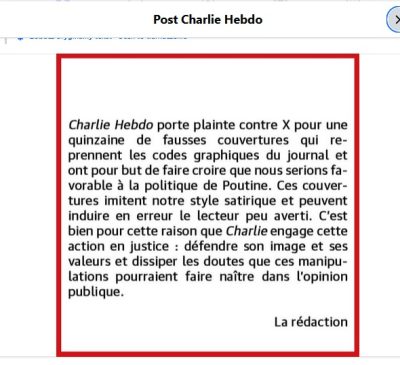French satirical publication Charlie Hebdo has filed a lawsuit regarding the distribution of fake covers on the social media site X, which mimic real editions of the weekly magazine.
“All of these clumsy forgeries share one common thread: they slander Ukraine, mock Europe’s and France’s support for Volodymyr Zelensky, and sometimes even spread rumours about Brigitte Macron’s gender identity. One might wonder whether Putin himself is behind their creation,” the editorial team wrote in an official statement.

The fake covers were paired with provocative content, which the editors believe was designed not only to undermine the magazine’s reputation but also to stir social tension and spread international disinformation. Among these were manipulated covers concerning the war in Ukraine.
One of the forged graphics, which particularly outraged public opinion, featured a cartoon of Ukrainian soldiers and refugees, with a satirical caption implying that Ukraine was provoking Russian attacks—supposedly in keeping with Charlie Hebdo’s characteristic dark humour. The editorial team firmly denied publishing such a cover, calling it “ a deliberate manipulation aligned with pro-Russian propaganda narratives.”
According to the magazine’s journalists, these forgeries surface online after every major escalation in the war in Eastern Europe, intending to confuse the public. “This is part of an information war. Someone is trying to use our style to legitimise anti-Ukrainian messaging, suggesting it comes from the West and liberal media,” the editor-in-chief told French media.
In their complaint filed with the Paris court, the editorial team is demanding punishment for those creating and distributing the fake content. Although the perpetrators remain unidentified, the case is being investigated by a cybercrime unit, among others. Sources close to the investigation suggest that some of the accounts spreading the disinformation are based in Eastern Europe, particularly in Russian-speaking cyberspace.
According to Le Figaro, quoting AFP, Charlie Hebdo’s lawyer, Richard Malka, stated that the fake covers “appear to be pro-Russian propaganda.”
The forged covers also touched on other controversial topics such as the Gaza conflict, the pandemic, abortion, and Islam—each time falsely attributing to Charlie Hebdo editorial staff extreme or shocking views that it never published.
The editorial team has urged both the media and internet users to exercise caution and verify information. They have also appealed to politicians and public opinion leaders to refrain from sharing unauthorised content. “These aren’t just fake covers. They’re weapons in an information war that can have real social and political consequences,” the editorial concluded.
According to the magazine’s statement, fifteen fake front pages over the past two years “were primarily aimed at the Russian public to make them believe Charlie Hebdo is an anti-Zelensky and pro-Putin newspaper.” These forgeries circulate “primarily on Telegram,” and more recently on platform X, “often accompanied by captions or comments in Russian,” the complaint notes.
Le Monde recalls that imitating major European media to spread propaganda online is a technique developed by Russian intelligence services as part of the influence operation called “Doppelgänger.”
What is Operation “Doppelgänger”
The operation was exposed by the EU organisation DisinfoLab, which named it “Doppelganger” due to its strategy of impersonating prominent media outlets. The operation revolves around creating fake clones of renowned news sites—such as Le Monde, Der Spiegel, BBC, and The Guardian—with subtle domain name alterations (e.g., “lemonde[.]press” instead of “lemonde.fr”). Fabricated articles are published on these platforms and then spread via networks of fake social media accounts.
Who’s behind it?
EU DisinfoLab and other investigative bodies have traced the operation back to Russian firms Social Design Agency (SDA) and Struktura, both operating under the watchful eye of the Kremlin. “Doppelgänger” also uses supporting operations like “Matriochka” and “Overload,” which produce fake video content and distribute it via coordinated social media accounts.
Main Objectives of Operation “Doppelgänger”
Undermining support for Ukraine by spreading false narratives about alleged Nazism and corruption in the Ukrainian government.
Creating divisions in pro-Ukraine countries by suggesting that aid to Ukraine is ineffective or detrimental to their own citizens.
Influencing elections in democratic countries and promoting pro-Russian political parties.
“Doppelgänger” is considered one of the most elaborate Russian information warfare campaigns aimed at destabilising democratic societies and weakening support for Ukraine. Despite being exposed, the operation remains active and continues to adapt, highlighting the ongoing need for vigilance and public education in combating disinformation.
In late 2022, following initial investigations by the German press and non-governmental organisations EU DisinfoLab and Qurium, Meta described it as “the largest and most complex Russian disinformation operation since the start of the war in Ukraine, marked by an exceptional level of sophistication and intensity.” Facebook’s owner then announced it had removed over 1,600 accounts and 700 pages.
Written by ih
Sources:
Charlie Hebdo porte plainte contre X après la publication de fausses Unes pro-Poutine
As a reminder, in 2015, the magazine’s offices were the site of a brutal terrorist attack by Islamists, in which 12 people were killed. Since this tragic event, the journal has been operating under constant protection.

COMMENTS